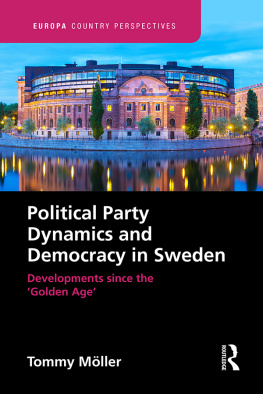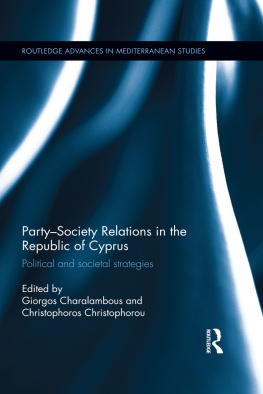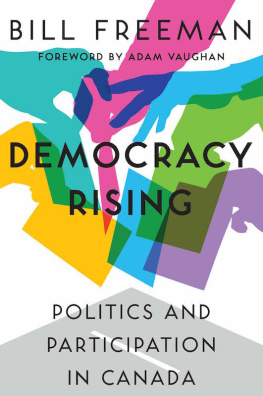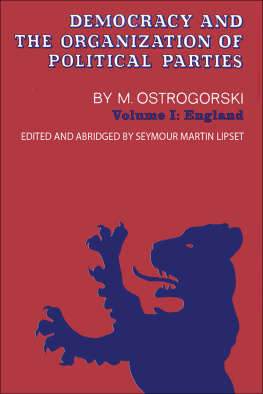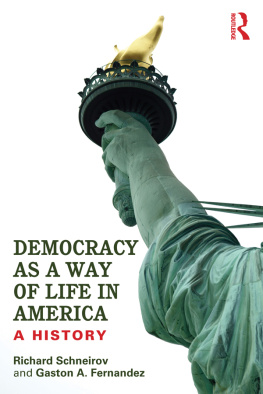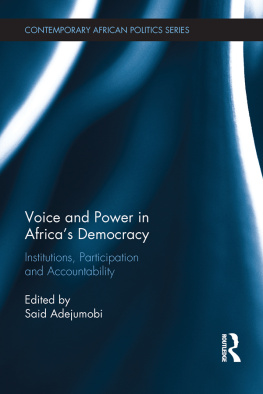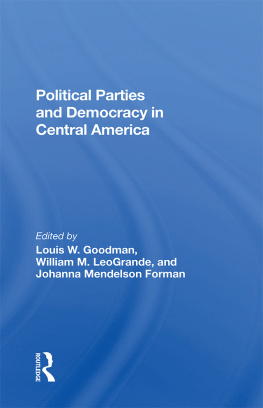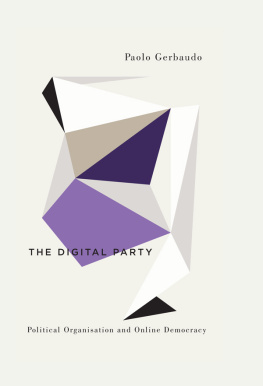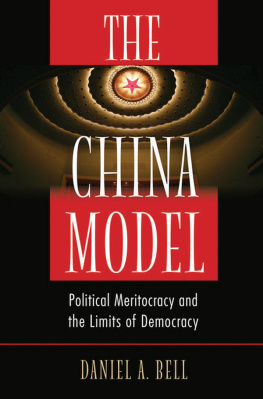University of Virginia Press
2014 by the Rector and Visitors of the University of Virginia
All rights reserved
Printed in the United States of America on acid-free paper
First published 2014
9 8 7 6 5 4 3 2 1
Library of Congress Cataloging-in-Publication Data
Peart, Daniel, 1985
Era of Experimentation : American political practices in the early republic /
Daniel Peart.
p. cm. (Jeffersonian America)
Includes bibliographical references and index.
ISBN 978-0-8139-3560-7 (cloth : alk. paper) ISBN 978-0-8139-3561-4 (e-book)
1. United StatesPolitics and government1815-1861. 2. Political partiesUnited
StatesHistory19th century. 3. Political participationUnited StatesHistory
19th century. 4. ElectionsUnited StatesHistory19th century. 5. Political culture
United StatesHistory19th century. I. Title.
E338.P37 2014
320.97309034dc23
2013039748
ACKNOWLEDGMENTS
You would not be reading this book today if the following people and institutions had not helped me to write it, and for that I owe them my thanks.
First off, it is proper that I recognize the invaluable financial support I received from the following sources: University College London; the Central Research Fund of the University of London; the Peter J. Parish Memorial Fund, administered by the Association of British American Nineteenth Century Historians; the British Association for American Studies; the Gilder Lehrman Institute of American History; the King V. Hostick Award, administered by the Illinois State Historical Society; the Barra Foundation International Fellowship, administered by the Library Company of Philadelphia and the Historical Society of Pennsylvania; and the Mellon Research Fellowship, administered by the Virginia Historical Society. I am grateful for their aid at the outset of my academic career.
For their unfailing willingness to assist a frequently bewildered British graduate student Id like to thank the staff at the following U.S. archives: the Abraham Lincoln Presidential Library, the Boston Athenaeum, the Boston Public Library, the Chicago History Museum, the Edwardsville (IL) Public Library, the Historical Society of Pennsylvania, the Illinois History and Lincoln Collections at the University of Illinois, the Illinois State Archives, the Library Company of Philadelphia, the Library of Congress, the Library of Virginia, the Massachusetts Historical Society, the New York Historical Society, the New York Public Library, the Rare Book and Manuscript Library at the University of Pennsylvania, and the Virginia Historical Society. Special thanks must go to Tom Schwartz, of the Illinois State Historical Society, and Jim Green, of the Library Company of Philadelphia, for their efforts to make sure my stay at their respective institutions was both pleasant and productive. Most of all, though, Id like to thank Cheryl, Debbie, and Glenna at the Abraham Lincoln Presidential Library and Judy (and her husband, Mike) at the Edwardsville Public Library for going out of their way to make me feel at home in the wonderful state of Illinois (which is, I discovered, almost as flat as the Fens of Lincolnshire, where I grew up). I cannot think of a finer example of American hospitality.
Unfortunately, there were many parts of the United States that I could not find time to visit. Fortunately, though, I was able to avail myself of the efficient remote-research facilities offered by the following archives: the Alabama Department of Archives and History, the Albert and Shirley Small Special Collections at the University of Virginia, the American Antiquarian Society, the Earl Gregg Swem Library at the College of William & Mary, the Georgia Historical Society, the Indiana State Library, the John Hay Library at Brown University, the Knox County (TN) Public Library, the Mississippi Department of Archives and History, the Missouri History Museum, and the University of Delaware Library. Thanks too to Heather at the Massachusetts Historical Society, who tracked down all of the information that I realized I needed after I had left Boston.
Several individuals helped me out when I came up against specific obstacles. Donald DeBats, Jeffrey Pasley, John Sacher, Jeffrey Selinger, and (on multiple occasions) Donald Ratcliffe graciously responded to queries on subjects that were only tangentially related to their own research. Mick Bignell facilitated my data collection by giving me the benefit of his IT know-how. And without the assistance of Phil Lampi, liberally requested and always cheerfully granted, I could never have conducted the analysis of voter turnout that provided the starting point for my thesis. By extension I am also grateful to all the staff who have contributed to making Phils treasure trove of election returns freely available online via the A New Nation Votes project.
This book has been improved by feedback I received on papers presented at the American History seminar series at the Institute of Historical Research, the American Politics Group conference, the Association of British American Nineteenth Century Historians conference, the Commonwealth Fund conference at University College London, the Ireland, America and the Worlds of Mathew Carey conference at Trinity College Dublin, and the Society for Historians of the Early American Republic conference. It has also been improved by the thoughtful comments and criticism of Jonathan Chandler, Reeve Huston, Johann N. Neem, Andrew Robertson, and David Sim, all of whom generously agreed to read a full draft of the manuscript. And it wouldnt even be a book without the support of Stephen Conway and Adam I. P. Smith, my supervisors at University College London. Though not a nineteenth-century specialist himself, Stephen was always willing to discuss my research at length, and his insightful questions frequently set me thinking about the subject in new and fruitful ways. As for Adam, it was he who first sparked my interest in the history of U.S. politics as an undergraduate student, and he has continued to shape my development as a historian ever since.
For all their help in preparing this book for publication, Id like to thank Dick Holway and the rest of the editorial team at the University of Virginia Press, as well as Doug Bradburn for introducing me to them in the first place and Joanne Allen for her expert copy editing. Parts of have previously been published in Looking Beyond Parties and Elections: The Making of United States Tariff Policy during the Early 1820s, Journal of the Early Republic 33 (Spring 2013): 87108; I am grateful to the University of Pennsylvania Press and to the Society for Historians of the Early American Republic for their permission to reproduce those parts here. And thanks are due too to my own editorial team here in the United Kingdom. My sisters, Louise and Julia, served as dedicated proofreaders; any remaining errors I am certainly responsible for. And my girlfriend, Helen, has seen this project through from beginning to end and supported me every step of the way.


